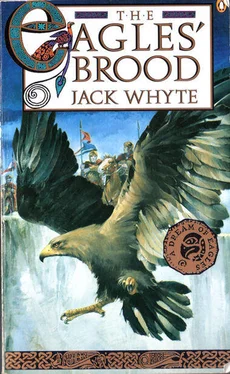"Caius, can you hear me?" I gazed at her.
"Caius, can you understand me?" There was a different tone to her voice now. "I know you can see me, and I know you can hear me, so if you understand my words, squeeze my hand the way I am squeezing yours." Again I felt the pressure of her hands. "Squeeze my hand, Cay." I tried, and she felt it, and her eyes filled with tears. She moved even closer to me, sitting on the edge of my bed.
"You can understand. I knew you could!" She smiled now, and such was the warmth of that smile, the love and the tolerance in it, that I felt my own face respond and my lips move to form an answering smile. Her face grew radiant.
"Do you know me? Do you know where you are?" No response. I didn't know how to respond. Undeterred, she went on, "If you do know me, or if you know where you are, squeeze my hand again." She waited until she was sure that I was not responding, then she tried again. "Very well, if you do not know me, squeeze my hand." I squeezed, and she sat back with a short cry, but only for a moment. Then she was leaning forward again.
"Now listen to me, Cay. I am your aunt. My name is Luceiia. Can you say that?" Again, I understood her words and knew what she wanted, but I did not know what she wanted me to do. She moved again, so that she sat with her hip against me, her body twisted so she could look directly into my face. She moved her mouth slowly, speaking clearly: "Lu-cei-ia. Loo-chee-ya. Say that, Cay."
I felt my tongue move but my lips were gummed together. They would not open. She was watching my mouth closely now and she rose and moved away quickly, returning with a moist cloth which she used to clean my lips, running her cloth-wrapped finger end into my mouth and around my gums. It felt wonderful. She tried again, and this time I repeated what she had said. "Luceiia." It meant nothing to me, but it was obviously very important to her. I had learned my first word.
I learned very quickly after that, as a child does and, like a clever child, I had many willing teachers. The thin, dark- faced man told me that his name was Lucanus and that he and I had once been friends, but that I had lost my memory. He told me that my memory loss was complete, that I was an empty vessel, but that I might one day remember everything. In the meantime, he said, I could relearn all that I had forgotten. He was encouraged in this belief, he told me, because I was not a completely empty vessel. I could still speak and understand what was being said to me, which meant that, somehow, the damage done to me had not been unlimited. I remember that today, his way of phrasing that. He did not say the damage had been limited; it had not been unlimited. Even though that subtlety escaped me at the time, I also remember that I wondered what he meant, and asked him. He blinked at me, then paused for a time before saying, "You were hit very hard on the head with a large metal ball.. .a club with a swinging head." That meant nothing to me, so he continued, watching my eyes closely all the time. "We thought you had been killed. Uther found you being guarded by young Donuil, your tame Celt"
"Uther?" I searched my empty mind, seeking for a meaning. "Who is Uther?"
"Uther is your cousin and your closest friend. He has been here several times to visit you. A big, dark-haired fellow with blue eyes and a long moustache." I smiled, remembering: Merlyn Caius Merlyn Britannicus. That had been Uther.
"Anyway, Uther had been tracking the invaders who ambushed you up in the hills, but he had not expected you or anyone else to come along, so you surprised him as much as your attackers surprised you. He had been plotting a trap of his own when you and your troopers sprung the trap in which you were hurt. By the time he was able to organize his forces and attempt a rescue, it was almost too late. He and his men drove off your attackers and brought you back here to Camulod. Do you remember Camulod?"
I shook my head, only then becoming conscious of the extent of things I could not remember. Thinking back to that time now, I see many things that I failed to grasp, let alone remember. When Lucanus told me, for example, of how he had bored a hole in my skull with an auger to relieve the pressure of blood built up in there and pressing on my brain, all the while fearing the attempt might kill me but blowing that I would inevitably die if he did not do something, I listened without surprise or disbelief, utterly oblivious that such things were not supposed to happen. Haematoma, he had called the pressure. He had relieved me of a haematoma by drilling a hole into my head while I lay unconscious, and the operation had been successful.
I spent many hours talking to Lucanus, and to many others throughout the years that have lapsed since then, about the phenomenon known to physicians as amnesia, although no one has known more about it than he did. I learned that it is a surprisingly common occurrence, stemming from a wide variety of causes, but that its very commonness of occurrence is the only common thing about it. No two cases that he had ever encountered, Lucanus told me long afterward, had ever been the same, or even comparable, apart from the single common point of memory loss. Some people lost only parts of their memories and never regained them. Others lost all memory, then regained it in a very short time. Some people's memories returned to them slowly, over years, while others regained theirs in their entirety within moments. Some amnesiacs retained familiarity with their surroundings but lost all knowledge of their own identities; still others knew perfectly well who and what they were but lost all awareness of limited periods in their past. Mine was the most drastic case Lucanus had ever encountered. I had lost everything, including self-awareness, and had become tabula rasa, as he termed it: an empty slate.
As time progressed, I found out everything about myself. I met all my old friends and renewed many friendships. Their assistance and the good will they accorded me made the process easy. And yet it was never complete, because the relationships, old as they might be, had no personal significance to me beyond the point at which they began again.
I identified with whatever it was that had occasioned these friendships originally, but I recalled nothing and no one. They brought the young Erse prince Donuil to see me and he spoke to me in his Celtic tongue and I understood him. He talked of the fight and how he had thought me dead after seeing me felled by my own flail. The man who swung it had been set to hit me again when Donuil killed him. I listened, responded politely in the young prince's own tongue and invited him to visit me again, but I did not remember him. They told me of my father, Picus Britannicus, and I had no recollection of him. They showed me my grandfather's books, and my great-uncle Varrus's books, but to me they were meaningless, because, although I could speak my own Latin language and the Celtic tongue, I could no longer read and the names of the writers meant nothing to me.
They told me that Cassandra was dead, with her unborn child, killed by persons unknown while on a visit to her secret home, and I accepted the information without comment since it had no relevance to me, even when they told me she had been my wife and the unborn child was mine. I was not callous; I was unknowing. My mind was empty of knowledge of her name, her face or her appearance. I relearned the facts, but I could not resurrect the emotional involvements.
Finally I moved out of my sick room and into the life of the fort they called Camulod. Uther, who should have been my teacher, I was told, was away on campaign in the south somewhere, fighting an extended war against King Lot of Cornwall—another meaningless name, although I understood its implicit menace. In his stead, therefore, Donuil the Hibernian prince and the Legates Flavius and Titus began to teach me to ride again and to handle weapons. I took to these activities immediately and instinctively, mastering each of the tasks I was set as quickly as they were presented, but none of them occasioned any further or deeper awareness. I simply had a natural aptitude for such things.
Читать дальше









